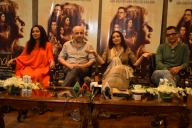Mumbai (IANS) Filmmaker Brahmanand S. Siingh’s upcoming feature “Jhalki” addresses the issue of child labour and trafficking. He says although the film is shown from the perspective of a child, it is not a childrens film. Rather, the narrative highlights their suffering.
” ‘Jhalki’ is not a children’s film. It is a reality many children suffer, owing to the practice of trafficking and child labour. But it is an engaging story for children because of the treatment of the narrative. The protagonist of the film is a nine-year-old girl named Jhalki, and we, as audience, see the world through her eyes. There is a beautiful folk song that is dying. we revived it in the film. We also used the hand shadow art — another dying art form. There are elements of fantasy that children have that we included,” said the filmmaker, about the film that features two young actors, Aarti and Goraksha, along with Boman Irani, Sanjay Suri, Divya Dutta, Tannishtha Chatterjee and Govind Namdev.
The film shows how a little girl fights for her young brother who is a victim of human trafficking and child labour. The filmmaker says the story alters the gender narrative in Bollywood.
“This story breaks the gender stereotype and without being preachy establishes a new-age narrative. In the film, the sister is in search of her brother to protect him from the danger of child labour and trafficking. From childhood, boys are told to protect girls — and that is their prime responsibility — because girls are weaker. ‘Jhalki’ proves this wrong. The film also shows how, despite facing obstacles, the little girl does not give up. The film inspires people to understand that the world belongs to people who do not give up,” he added.
The poster of the film was released at Cannes Film Festival earlier this year, followed by screening at various film festivals including New York Indian Film Festival, the Boston International Film Festival and the Singapore South Asian International Film Festival.
Asked about the response of the global audience, Singh said: “It is a global issue and the story is universal, not just happening in India. Any poverty-stricken society faces the same issue. That is why, at every film festival we have shown the film, the audience has given a positive response and found it relatable.”
The film will release on November 14 in theatres as well as on the mobile digital movie theatre platform PictureTime, for wider access in rural India.

